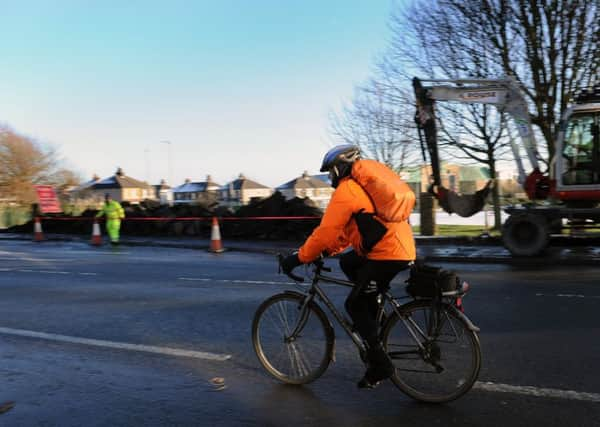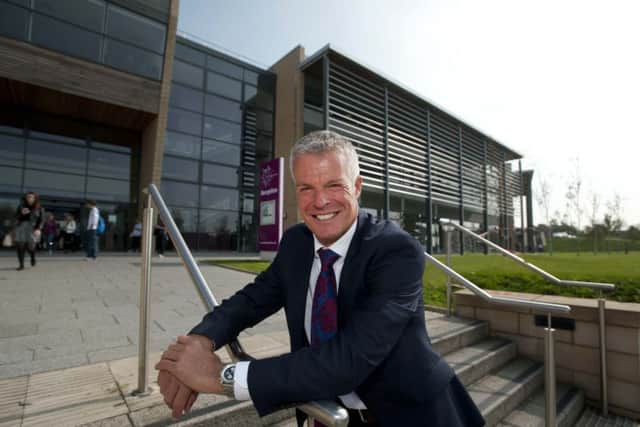It's illegal to cycle on the pavement - but police turn a blind eye, says lawyer '˜Mr Loophole'


Figures obtained by lawyer Nick Freeman, also known as ‘Mr Loophole’, reveal that West Yorkshire Police has issued many fewer fixed penalty notices to cyclists in recent years than other similar-sized forces.
The statistics released under the Freedom of Information Act reveal that four of the country’s biggest forces have seen sharp falls in the number of fines handed out for offences such as cycling on the pavement, riding at night without lights or failing to stop at junctions on a bike.
Advertisement
Hide AdAdvertisement
Hide AdIn 2015, 17 fixed penalties were handed out by West Yorkshire Police to cyclists, eight of which were for not having lights or reflectors fitted. The total is down from 23 in 2014, 39 in 2015 and 47 in 2012.


In comparison, Merseyside Police handed out 369 fines in 2015 and 552 in 2014, though the numbers have been dropping in recent years.
Greater Manchester Police issued 114 fixed penalty notices for cycling offences last year, 150 in 2014 and 196 in 2013.
Though the Metropolitan Police in London, the country’s biggest police force, issued 3,270 fines to cyclists last year, the number has fallen sharply since 2011, where 9,850 were handed out.
Advertisement
Hide AdAdvertisement
Hide AdMr Freeman, a specialist in defending people accused of traffic or speeding offences whose past clients include Jeremy Clarkson and Sir Alex Ferguson, said the lack of fines handed out in West Yorkshire was “astonishing”.


He said: “For a number of years now I have been calling for bicycles to have identification plates so those riders who break the law can be caught and prosecuted.
“Whilst some may suggest the figures have fallen because less cyclists are breaking the law that is clearly total nonsense.
“Every day, I see a plethora of cyclists breaking a number of laws including riding on footpaths, riding through red lights and cycling at night without lights.
Advertisement
Hide AdAdvertisement
Hide Ad“Yet, because they are unidentifiable, coupled with a dwindling number of traffic police who regard these offences as low priority - they get away with it.
“The figures from West Yorkshire Police are simply pitiful. This force covers the cities of Leeds, Bradford and Wakefield and yet it only fined three cyclists last year for riding on the pavement. I find that astonishing.”
Martin Stanley, chairman of Leeds Cycling Campaign, which lobbies for improved cycling provision in the city, described Mr Freeman’s comments as “incredibly hypocritical”.
He said: “He claims to be acting in the interests of safety but he has made a career of allowing dangerous drivers to continue driving by exploiting loopholes in the law. I would suggest this is more about self-promotion rather than any interest in reducing death and injury.
Advertisement
Hide AdAdvertisement
Hide Ad“If Nick checked the statistics he would see that only two per cent of pedestrians injured on pavements are due to people on bikes compared to 58 per cent injured by drivers. Therefore it is clear that policing has to be proportional to the risk presented.
“His call for registration plates for bikes is clearly ridiculous. The cost of implementing this would vastly outweigh any benefits, and you only have to look at the roads to see that registration plates on motor vehicles does not stop them breaking the law.”
He added: “I think the majority of people that ride bikes in Leeds would be happy for those so-called rogue cyclists to be fined more, if that is reflected across the board in terms of fines given out to other motorists as well.
“It is about policing. The relative risk to the public is far greater when a driver goes through a red light or is talking on their mobile phone than when you are riding.
Advertisement
Hide AdAdvertisement
Hide Ad“Police have to prioritise where their resources go, the risk from people cycling on the pavement is miniscule.”
When cycling on the pavement was made a fixed penalty offence in 1999, Government minister Paul Boateng urged police to use “sensitivity and careful use of discretion” when applying the law.
He said: “The introduction of the fixed penalty is not aimed at responsible cyclists who sometimes feel obliged to use the pavement out of fear of the traffic, and who show consideration to other pavement users.
“Chief police officers, who are responsible for enforcement, acknowledge that many cyclists, particularly children and young people, are afraid to cycle on the road.”
West Yorkshire Police declined to comment on the figures.
Advertisement
Hide AdAdvertisement
Hide AdNick Smart of West Yorkshire’s Police Federation, which represents rank and file officers, said the force had reduced the number of specialist traffic officers it employs because of budget cuts.
He said: “Like every department the force has had to re model traffic departments in order to save in excess of £160 million pounds in cuts.
“The type of demand for our services has changed and increased in terms of complexity, investigation time and resources required.
“It’s a question having sufficient officers and the capacity to deal with variety of calls that we face on a daily basis that ranges from cycle enforcement, to counter terrorism and serious crime.”